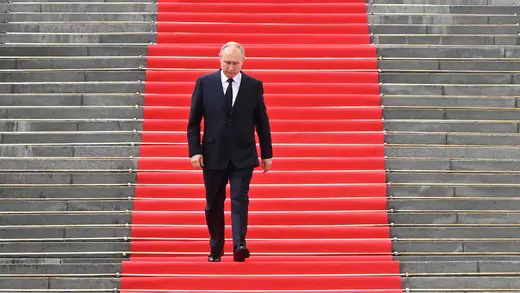Domestic instability in Russia has been a perpetual concern for Europeans due to their geographic proximity. Prior to the invasion of Ukraine, many European policymakers shared the perception that Russia’s President Vladimir Putin may be a ruthless autocratic leader, but he at least provided stability in Russia while the alternatives could be worse. After the invasion, policymakers, especially in Western Europe, continued to assume that any immediate challenge to the regime was wishful thinking.
Yevgeny Prigozhin’s rebellion has now put the fragility of Putin’s regime on full display. This is a wake-up call for Europeans. Europe is no longer facing a choice between Putin and instability. Putin is the instability, domestically and externally. French President Emmanuel Macron said the mutiny has revealed the fragility and the divisions within Russia, and urged vigilance.
More on:
European states would be among the first to experience the consequences of instability in Russia. They need to plan for the real possibility that a post-Putin Russia could be characterized by radical right-wing nationalism and/or chaos rather than liberalization. This planning process should take place within the European Union (EU) as well as the North Atlantic Treaty Organization (NATO). It should extend beyond scenario exercises, and instead develop concrete emergency response plans addressing the implications of political turmoil and a power vacuum in Russia. The discussion of European foreign ministers on June 26 provided a starting point, and the NATO Vilnius Summit on July 11 and 12 is another opportunity for confidential dialogue on the potential implications and responses.
The following issues should be at the top of their list:
- Refugee flows. The invasion of Ukraine and the exodus of hundreds of thousands of Russian and Ukrainian citizens in response has already created significant pressures at the EU’s borders. The current response to Russian refugees is uneven and bureaucratic, with some EU countries imposing ever stricter restrictions due to security concerns. Potentially violent instability in Russia could create a much bigger outpour of refugees from Russia with Europe as a first destination, along with Turkey, the South Caucasus, and Central Asia.
- Flare-up of conflicts in the neighborhood. A power vacuum in Russia could result in a burst of conflicts in Moldova, which is an EU candidate country, and Georgia, which has an association agreement and a visa-free travel regime with the EU. Among other scenarios, conflicts with the Russian-backed breakaway territories of Transnistria in Moldova as well as South Ossetia and Abkhazia in Georgia could ignite.
- Proliferation and weapons of mass destruction (WMD). Although the United States is the primary interlocutor for managing the nuclear relationship with Russia, proliferation of WMD—including chemical and biological weapons—should also be of concern to European policymakers, given Europe’s extensive land border with Russia.
- Security of NATO allies bordering Russia. A demise of state monopoly on using force within Russia, as well as a potentially radicalized new Russian leadership, could pose threats to NATO allies bordering Russia and increase the risk of escalation. Here, a strong deterrence message would be required by the United States and NATO.
- War in Ukraine. Domestic instability in Russia could open up new opportunities for Ukraine on the battlefield, and Europe should make use of such opportunities by providing Ukraine with the support it would need to exploit a potential weakening of the Russian military. Prigozhin’s rebellion may have lessened the concern that Putin could outlast Western support for Ukraine and thereby decide the war in his favor. Now, the clock appears to be ticking against Russia (and its internal cohesion), rather than against Ukraine.
The core interest of the West is to have Russia out of Ukraine, not regime change in Moscow. For this reason, the United States and Europe adopted highly restrained statements in response to the mutiny, framing it as an internal Russian affair—cautious to avoid any accusations of Western meddling. Close coordination, such as U.S. President Joe Biden’s phone call with leaders in London, Paris, and Berlin, and outreach by top U.S. diplomats and military leaders to their European counterparts, ensured a united transatlantic message in a moment of crisis in Russia. However, joint messaging will not be sufficient if such a scenario repeats itself. Detailed preparation is required for a future when another challenge to the Russian regime is more successful than the last—which could occur sooner than expected.
More on:
 Online Store
Online Store
